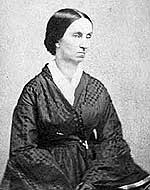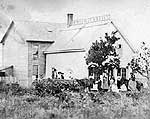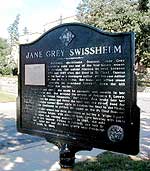By Tim Post
Minnesota Public Radio
September 26, 2002
Most women on the Minnesota frontier in the 1850s and 1860s were homemakers and farm wives. But Jane Gray Swisshelm cut against that stereotype. Swisshelm was a St. Cloud newspaper editor with strong opinions. She used her position to fight against slavery and for women's rights. But while she wrote articles advocating more freedom for some, she also a pushed for the extermination of the state's Dakota indian population.
There's a plaque near St. Cloud State University honoring Swisshelm. Some say it should be taken down, but local historians say the plaque should stay.
| |
|
|
|
||
Jane Gray Swisshelm came to St. Cloud from Pittsburgh in the late 1850s, and became editor of the St. Cloud Visiter. Her office was on a bluff overlooking the Mississippi River. It's a piece of land now surrounded by dorms and parking lots on the campus of St. Cloud State University.
"We are standing at what I assume to be the location of this office - which goes back to 1858 - and stood here through the Civil War at least, and probably beyond," says Bill Morgan, a retired history professor from St. Cloud State.
Morgan says Swisshelm was a strong woman. She was a single working mother on Minnesota's frontier, and she wasn't afraid to print editorials that angered locals. Swisshelm made some prominent citizens so angry, a group of them attacked her office one March night in 1858.
"The three of them broke into her shop, destroyed her press, took her type boxes and the type and dumped them out in the street right out here and into the river," Morgan says.
A group of people from St. Cloud raised money to buy Swisshelm a new press and she was back in business.
| |
|
|
|
||
Swisshelm used her newspaper to promote the causes she believed in. She was an abolitionist, and let her readers know that her newspaper was an anti-slavery publication.
This passage is from an article Swisshelm wrote for the St. Cloud Democrat in Nov., 1862.
"We hold that American Slavery is a combination of all crimes against God and Man - "the sum of all villianies" - that it is contrary to the revealed will of God and the Constitution of the United States, and as Christians and Patriots all men are in duty bound to labor for its immediate and utter extinction," she wrote.
Swisshelm was also one of the nation's early feminists. She took up the fight for women's rights, and demanded women have a voice in how the country was run.
|
"Exterminate the wild beasts, and make peace with the devil and all his hosts sooner than these red-jawed tigers whose fangs are dripping with the blood of the innocents! Get ready, and as soon as these convicted murderers are turned loose, shoot them and be sure they are shot dead, dead, DEAD, DEAD! "
- Jane Gray Swisshelm, on the Dakota Indians - Nov. 13, 1862 |
But while Swisshelm fought for the freedom of slaves and the rights of women, her feelings toward the state's Dakota Indian population were not so generous.
When she came to Minnesota, she thought settlers and American Indians would make peaceful neighbors.
But she changed her mind in late summer of 1862, when a group of Dakota Indians attacked white settlers. Tensions were high because government payments and food for the Indians were late. The Dakota were starving.
"Her views changed at the time of the Dakota conflict," says historian Bill Morgan. "When white settlers were killed by renegades, she switched her views entirely and really went overboard."
Swisshelm spouted a stream of editorials against American Indians during the bloody five week U.S. - Dakota war. In an editorial published in 1862, she called for the punishment of all Indians, whether or not they were involved in the attacks.
"Exterminate the wild beasts, and make peace with the devil and all his hosts sooner than these red-jawed tigers, whose fangs are dripping with the blood of the innocents! Get ready, and as soon as these convicted murderers are turned loose, shoot them and be sure they are shot dead, dead, DEAD, DEAD! If they have any souls, the Lord can have mercy on them if he pleases! But that is His business. Ours is to kill the lazy vermin and make sure of killing them."
|
"We hold that American Slavery is a combination of all crimes against God and Man - "the sum of all villianies" - that it is contrary to the revealed will of God and the Constitution of the United States, and as Christians and Patriots all men are in duty bound to labor for its immediate and utter extinction."
- Swisshelm on slavery - Nov. 1862 |
Swisshelm demonized the Indians in an effort to help settle the state of Minnesota, according to Sylvia Hoffert, a professor of History and Women's Studies at the University of North Carolina at Chapel Hill. Hoffert is working on a biography of Swisshelm. She says Swisshelm's supporters were land speculators.
"What she wants to do is say, 'This is a safe place to come and bring family and to farm.' So trying to solve, in her particular way, the so-called 'Indian problem' would have been a part of that goal - to say, 'OK, the indians have rebelled, and this is what we are doing about it, and it's now OK to come to Minnesota," says Hoffert.
Some people in St. Cloud are appalled that Swisshelm is honored in a public place. There's a plaque that tells the story of Jane Gray Swisshelm near the spot where her office stood.
It mentions her opposition to slavery, her fight for women's rights, her time as a Civil War nurse. But the plaque doesn't mention her racist, anti-Indian writings.
That's a part of Swisshelm's life some say should be told.
"The more history that people know, the more accurate it is," says Don Day, director of the American Indian Center at St. Cloud State University. "I'm not saying we need to rewrite history or change history, we just need to have a more complete history of everything that goes on around us."
| |
|
|
|
||
Day is a member of the Leech Lake Band of Ojibwe. He wants people to know about Swisshelm's views on American Indians, but he doesn't think Swisshelm should be villified.
"We can't deny any of the things that she did. She was great - she was an abolitionist, she moved women's rights to points where people never even thought of before," says Day. "She was actually hated in her time for the progressive thoughts that she had, so we can't deny any of that ... but we also can't deny that she was a racist."
Day thinks the best way to do that is to add more information to the plaque. He's not sure what it should say, but he says that extra history would be a great teaching tool.
It could teach students about the noble causes Swisshelm fought for, and about the racism American Indians faced in Minnesota's early days.
Historian Bill Morgan knows exactly what he would add to the Swisshelm plaque.
"If I were to rewrite the plaque I would say something like, 'As broad minded as she was, a Renaissance woman, she was blind in one area, but blinded again by historical events going on around her,'" he says.
|
"We hold that as women have as much at stake in the prosperity of government, and are often called upon to suffer more than men from war and other political evils...she has an inalienable right to a voice in the management of state affairs. "
- Swisshelm on women's rights - Nov. 1862 |
Morgan says removing the plaque would be a bad idea. That's an idea endorsed by the campus newspaper. In a recent editorial, the University Chronicle said the plaque should come down.
Officials at St. Cloud State University are pushing for the end of offensive Indian nicknames in the NCAA, and the student newspaper says tearing down the plaque would fit well with that effort.
Lesle Andres, editor of the University Chronicle, wavers a bit when it comes to what should happen to the plaque.
"Tearing it down ... would probably be the best way to go, personally. If it were just to add she was a racist, she was anti-American Indian, that would be a good step - personally, that's what I think."
Andres admits the issue isn't on the minds of most students at St. Cloud State, but he says any discussion of race issues is positive.
St. Cloud State officials say they have no plans yet to change the Jane Gray Swisshelm plaque on campus. They say they'll meet with people on both sides of the issue before they decide what to do.
The question they face is a tough one. Should Jane Gray Swisshelm be remembered as a hero, as a racist? Or for what historians say she was - a woman of contradiction.
More from MPR


